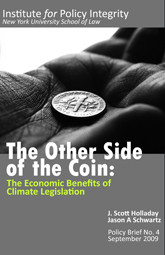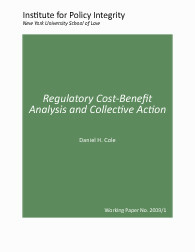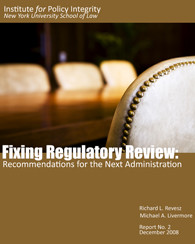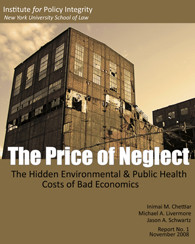-

The Other Side of the Coin
The Economic Benefits of Climate Legislation
This brief compiles estimates from several different federal agencies, and calculates that the economic benefits of the emissions cap in the Waxman-Markey bill likely dwarf the costs by as much as 9-to-1 or more. The benefit to cost ratio was determined using the EPA’s previously released (and peer reviewed) cost estimates and a newly released “social cost of carbon” estimate from an interagency process which provides a conservative dollar figure for the benefits of greenhouse gas reductions.
-

Regulatory Cost-Benefit Analysis and Collective Action
In Regulatory Cost-Benefit Analysis and Collective Action, Daniel H. Cole describes the influence of cost-benefit analysis and explains how and why it is a politically useful tools for agencies, even when those agencies are not required by law to prepare regulatory cost-benefit analyses (RCBA). As Cole says in his introduction, “For better or for worse, RCBAs have significantly influenced policies for dealing with, or not dealing with, collective action problems ranging from airport enlargement to global climate change.”
-
_110_170_90.jpg)
Federalism Accountability
“Agency Forcing” Measures
In Federalism Accountability: “Agency Forcing” Measures, author Catherine M. Sharkey advocates a variety of “agency-forcing” measures designed to enhance the ability of Congress, the executive, and especially the courts to ensure that agencies abide by executive mandates and other reforms, and to provide a check on overt politicization or inaction on agencies’ part.
-

Fixing Regulatory Review
Recommendations for the Next Administration
Fixing Regulatory Review: Recommendations for the Next Administration provides a set of recommendations for the Obama Administration to improve the process of regulatory review. It includes ten principles that should inform regulatory review and cost-benefit analysis of regulation, as well as a detailed markup of the Executive Order signed by President William Jefferson Clinton that established the structure of review that is currently in place.
-

The Price of Neglect
The Hidden Environmental and Public Health Costs of Bad Economics
This report examines the regulatory failures of the Bush years on issues as wide-ranging as climate change and workplace safety, and concludes that these failures did not arise because of an overuse of economics, but because economic and scientific evidence was ignored.
Viewing all publications in Government Transparency
